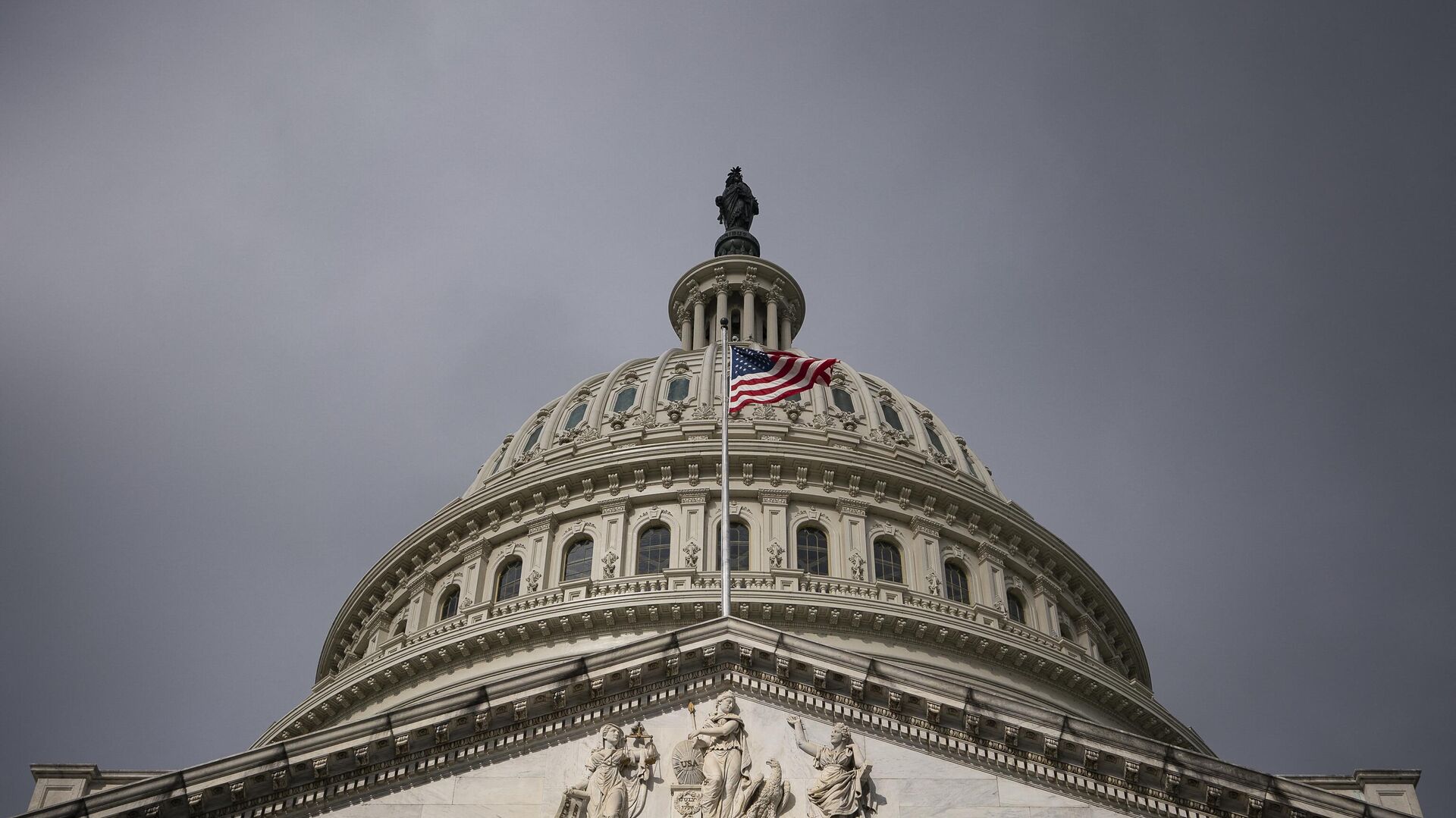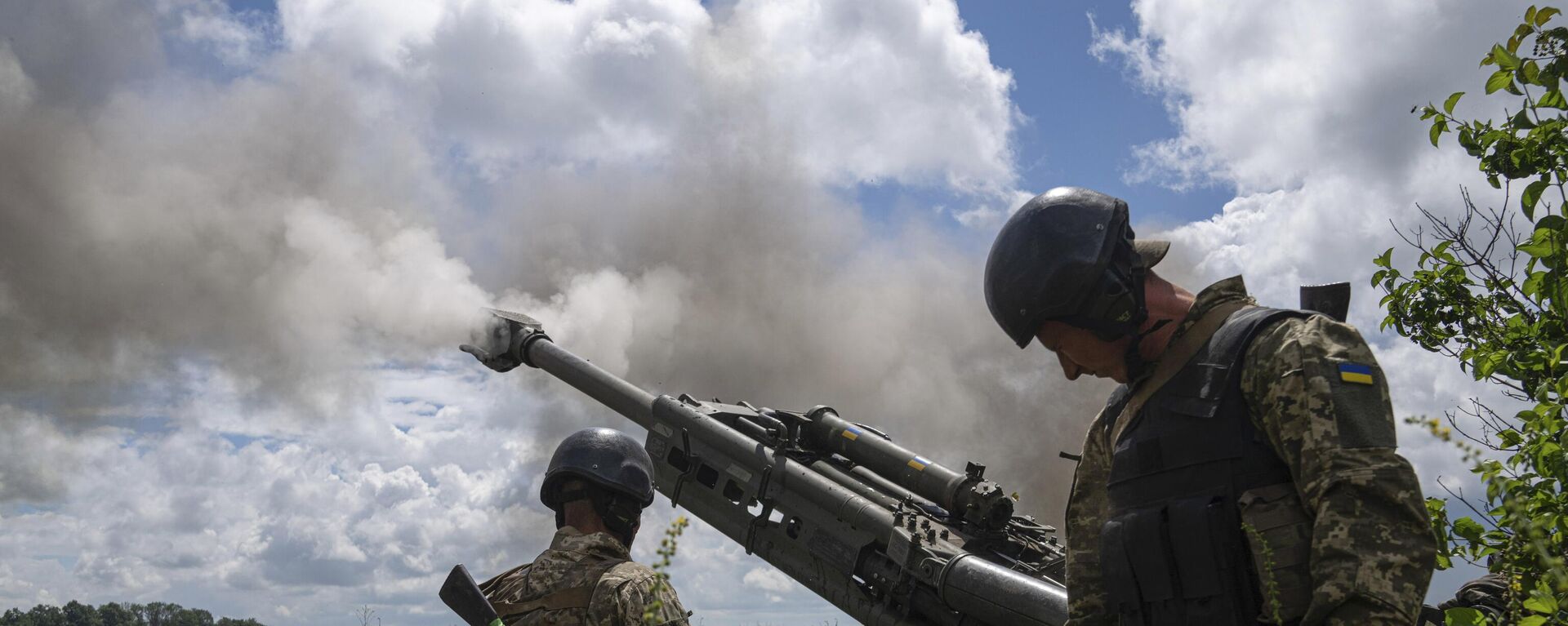https://sputnikglobe.com/20230718/us-vexed-as-procedural-holdups-leave-diplomatic-nominees-in-senate-limbo-1111958471.html
US Vexed as Procedural Holdups Leave Diplomatic Nominees in Senate 'Limbo'
US Vexed as Procedural Holdups Leave Diplomatic Nominees in Senate 'Limbo'
Sputnik International
US Secretary of State Antony Blinken has urged the Senate to confirm over 60 State Department nominees currently remaining “in limbo,” held up by lawmakers wielding “blanket holds” as leverage over various issues.
2023-07-18T12:03+0000
2023-07-18T12:03+0000
2023-07-18T12:23+0000
americas
us
us senate
antony blinken
nominees
https://cdn1.img.sputnikglobe.com/img/07e7/07/12/1111956625_0:161:3071:1888_1920x0_80_0_0_fcea9981d1cb3ce668ab02c993d2d0fc.jpg
The huge time it is taking for the Senate to confirm ambassadors and presidential nominees to other key posts abroad has prompted Secretary of State Antony Blinken to warn that "foreign policy and national security interests" are at stake.While the emerging multipolar world order is strengthening, and a growing number of countries are fleeing the US dollar in international settlements, sick of Washington’s policy of “weaponizing” the greenback, there are countries, for example, in Latin America, that haven’t had a US ambassador in place in more than a year. This prompted US Secretary of State Antony Blinken to urge the Senate to confirm over 60 State Department nominees currently remaining “in limbo,” held up by lawmakers wielding “blanket holds” as leverage over various issues. Among those still awaiting confirmation - some for over 18 months - are sixty-two diplomatic nominees, including 38 nominated for ambassador positions.US 'Shorthanded' on Global StageBlinken revealed that by the summer's end it was likely that, "Egypt, Israel, Jordan and Lebanon will all be without confirmed US ambassadors.” He added that vacant ambassadorial posts remained in Europe, Asia, and Latin America.Persisting vacancies put the US at a "disadvantage" in its global competition with countries like China, one Senate Democratic aide was cited as saying, pointing to the fact that Beijing has ambassadors in dozens of foreign capitals where Washington doesn't.The White House officials fret over the ineffective system they are forced to contend with, concerned that it can feed into the waning US global clout. Over the past year, the escalation of the Ukrainian crisis into a full-blown NATO-Russia proxy war served to accelerate the creation of an alternative to the US and Western-led global political and economic order. Backfiring sanctions on Russia have also forced many countries to realize that the loss of the dollar's dominant status as the major reserve currency and main currency for global trade might be a good thing.Washington realizes full well that as steps are taken to undermine the dollar's supremacy, so America’s hegemonic role would shrink, making it just one of many global players, forced to play a lesser role globally. Hence the worry over empty seats in embassies abroad.Senate 'Purgatory'Sweeping blocks on State Department and Pentagon nominees that require congressional confirmation have dragged on for months due to the arcane "unanimous consent" in Senate procedure. Someone not well-versed in the US Senate rulebook might be surprised to discover how much power even one lawmaker wields. By pumping the brakes on the confirmation process, critically important vacancies are allowed to linger on. Accordingly, bipartisan conflicting agendas and even individual grievances can leave national security nominees in limbo.The latest such use of "senatorial privileges" has been employed by Sen. Rand Paul, R-Ky., who blocked State Department nominees while seeking information from the Biden administration documents pertaining to the origins of the COVID-19 pandemic. His move is reportedly keeping several dozen nominees for senior diplomatic and aid posts suspended, according to cited congressional records.Meanwhile, related to the Pentagon, Alabama Sen. Tommy Tuberville has blocked close to 250 senior Defense Department civilian nominees and military promotions while protesting the administration’s policy providing abortion access to troops. Other Republican senators, including Ted Cruz of Texas and J.D. Vance of Ohio, have also blocked nominees.The average Senate confirmation process for a presidential nominee, which was an average of 56.4 days during the administration of Ronald Reagan (1981-1989) has extended under Joe Biden to around 127 days, according to data from the Partnership for Public Service. The nonprofit group, after releasing the figures, advocated for changes that would streamline the confirmation process. However, no matter how much cases like that of Sen. Rand Paul, or that of Sen. Tommy Tuberville may rankle on both sides of the aisle, when it comes to changing the Senate's rules and practices, lawmakers appear wary of any reforms that might infringe upon these same "powerful privileges."The procedural hurdles that the US is currently facing in the Senate call to mind other hiccups, like the Pentagon’s 'accounting error' not long ago. The Pentagon discovered inconsistencies in equipment valuation for Ukraine, when “replacement cost” was used instead of “net book value” resulting in overestimating the value of the equipment drawn down from US stocks.Later, US media reported that the Defense Department overvalued the cost of assistance for Ukraine by about $3 billion, opening up a possibility that Washington will be able to funnel even more security assistance to prop up the Kiev regime.
https://sputnikglobe.com/20230717/what-is-meant-by-de-dollarization-1111947106.html
https://sputnikglobe.com/20230710/us-marine-corps-left-leaderless-as-gop-senator-stonewalls-confirmation-process-1111800606.html
https://sputnikglobe.com/20230621/pentagon-magically-finds-extra-6bn-of-arms-for-ukraine-in-accounting-error-1111358790.html
americas
Sputnik International
feedback@sputniknews.com
+74956456601
MIA „Rossiya Segodnya“
2023
News
en_EN
Sputnik International
feedback@sputniknews.com
+74956456601
MIA „Rossiya Segodnya“
Sputnik International
feedback@sputniknews.com
+74956456601
MIA „Rossiya Segodnya“
us secretary of state antony blinken, senate confirmation, state department nominees, blanket holds on nominees, diplomatic posts
us secretary of state antony blinken, senate confirmation, state department nominees, blanket holds on nominees, diplomatic posts
US Vexed as Procedural Holdups Leave Diplomatic Nominees in Senate 'Limbo'
12:03 GMT 18.07.2023 (Updated: 12:23 GMT 18.07.2023) Amid the US’ shrinking hegemonic role, along with an accelerating trend towards global de-dollarization, the fact that bureaucratic hurdles, such as a cumbersome Senate confirmation process, leave many diplomatic and national security posts sitting empty has been stroking frustration in Washington.
The huge time it is taking for the Senate to confirm ambassadors and presidential nominees to other key posts abroad has prompted Secretary of State Antony Blinken to warn that "foreign policy and national security interests" are at stake.
While the emerging
multipolar world order is strengthening, and a growing number of countries are
fleeing the US dollar in international settlements, sick of Washington’s policy of “weaponizing” the greenback, there are countries, for example, in Latin America, that haven’t had a US ambassador in place in more than a year.
This prompted US Secretary of State Antony Blinken to urge the Senate to confirm over 60 State Department nominees currently remaining “in limbo,” held up by lawmakers wielding “blanket holds” as leverage over various issues.
"I am again asking for your leadership to swiftly confirm State Department nominees on the floor... If you are holding one or more nominees, I respectfully ask that you reconsider or work with the Department to find a reasonable and expedited path forward. Our foreign policy and national security interests are depending on it.”
Among those still awaiting confirmation - some for over 18 months - are sixty-two diplomatic nominees, including 38 nominated for ambassador positions.
“People abroad see it as a sign of dysfunction, ineffectiveness, inability to put national interests over political ones. These unnecessary delays also weaken the State Department as an institution,” Blinken acknowledged at a briefing, decrying the fact that procedural holdups were "tying our hands behind our back.”
US 'Shorthanded' on Global Stage
Blinken revealed that by the summer's end it was likely that, "Egypt, Israel, Jordan and Lebanon will all be without confirmed US ambassadors.” He added that vacant ambassadorial posts remained in Europe, Asia, and Latin America.
Persisting vacancies put the US at a "disadvantage" in its global competition with countries like China, one Senate Democratic aide was cited as saying, pointing to the fact that Beijing has ambassadors in dozens of foreign capitals where Washington doesn't.
The White House officials fret over the ineffective system they are forced to contend with, concerned that it can feed into the waning US global clout. Over the past year, the escalation of the Ukrainian crisis into a full-blown
NATO-Russia proxy war served to accelerate the creation of an alternative to the US and Western-led global political and economic order. Backfiring sanctions on Russia have also forced many countries to realize that the loss of the
dollar's dominant status as the major reserve currency and main currency for global trade might be a good thing.
Washington realizes full well that as steps are taken to undermine the dollar's supremacy, so America’s hegemonic role would shrink, making it just one of many global players, forced to play a lesser role globally. Hence the worry over empty seats in embassies abroad.
Sweeping blocks on State Department and Pentagon nominees that require congressional confirmation have dragged on for months due to the arcane "unanimous consent" in Senate procedure. Someone not well-versed in the US Senate rulebook might be surprised to discover how much power even one lawmaker wields. By pumping the brakes on the confirmation process, critically important vacancies are allowed to linger on.
A US president nominates senior officials to posts across federal agencies. These go to the Senate for confirmation votes. However, one single senator can place a hold on any nominee. This, in turn, triggers a full vote on nominees instead of an expedited “unanimous consent” process. The legislative procedure like scheduling a vote can not only take up valuable floor time, but results in a Senate confirmation log-jam.
Accordingly, bipartisan conflicting agendas and even individual grievances can leave national security nominees in limbo.
The latest such use of "senatorial privileges" has been employed by Sen. Rand Paul, R-Ky., who blocked State Department nominees while seeking information from the Biden administration documents pertaining to the
origins of the COVID-19 pandemic. His move is reportedly keeping several dozen nominees for senior diplomatic and aid posts suspended, according to cited congressional records.
Meanwhile, related to the Pentagon, Alabama Sen. Tommy Tuberville
has blocked close to 250 senior Defense Department civilian nominees and military promotions while protesting the administration’s policy providing abortion access to troops. Other Republican senators, including Ted Cruz of Texas and J.D. Vance of Ohio, have also blocked nominees.
The average Senate confirmation process for a presidential nominee, which was an average of 56.4 days during the administration of Ronald Reagan (1981-1989) has extended under Joe Biden to around 127 days, according to
data from the
Partnership for Public Service. The nonprofit group, after releasing the figures, advocated for changes that would streamline the confirmation process. However, no matter how much cases like that of Sen. Rand Paul, or that of Sen. Tommy Tuberville may rankle on both sides of the aisle, when it comes to changing the Senate's rules and practices, lawmakers appear wary of any reforms that might infringe upon these same "powerful privileges."
The procedural hurdles that the US is currently facing in the Senate call to mind other hiccups, like the Pentagon’s 'accounting error' not long ago. The Pentagon discovered inconsistencies in equipment valuation for Ukraine, when “replacement cost” was used instead of “net book value” resulting in overestimating the value of the equipment drawn down from US stocks.
Later, US media reported that the Defense Department overvalued the cost of assistance for Ukraine by about $3 billion, opening up a possibility that Washington will be able to funnel even more security assistance to prop up the Kiev regime.





